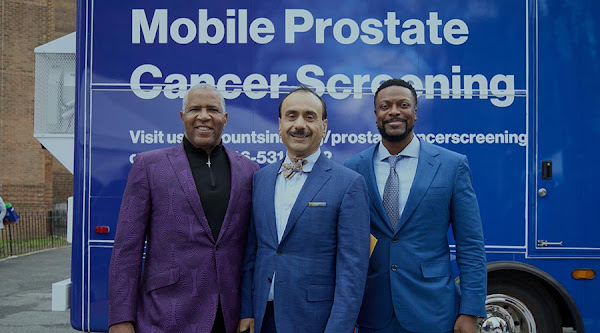For September, Prostate Cancer Awareness Month, Civil Rights icon Charles D. Neblett, PhD's family nonprofit organization, Community Projects, Inc. has created a new initiative, the #BlackProstateCancerCheckChallenge, asking Black prostate cancer survivors and patients to post their journeys using the hashtag. The purpose of the initiative is to open dialogue, overcome stigmas and fears, capture snapshots of experiences, and share information and resources to reveal the complex issues of health equity concerns among Black men @BlackProstateCheckChallenge on Instagram, TikTok, LinkedIn, Threads, and Facebook pages.
Charles D. Neblett, PhD was recently diagnosed with stage 4 metastatic prostate cancer and passed the torch to carry on his civil rights legacy in the fight for equity. ”To give a platform to the often-ignored opinions of African-American men, we launched this challenge to give them the space to be heard. Right now, we need to pay attention to what Black men as patients care about. We’ve asked doctors and policymakers to pay attention and listen to the relevant social media updates regarding urgent issues right now,” said son Kwesi Neblett, “Much effort has been put into screening, but not enough effort into Black men currently battling the disease right now. Too many Black men are passing away unnecessarily; thus, this is an urgent issue.” His father, Charles, added, “We want to have a voice in determining the best course of action for ourselves as individuals being treated with equity and in our community by discussing the effects of therapies on our genetics.” Black men, who live in areas where health problems are most prevalent, are the intended targets of this diversity challenge.”
The #BlackProstateCancerCheckChallenge Panel includes:
Kwesi Neblett, President of Community Projects, Inc. creator of #BlackProstateCancerCheckChallenge
Charles D. Neblett, PhD, Founder, Community Projects, Inc.
Dr. Lisa Cooper, Internal Medicine, MD at Johns Hopkins, elected member of the National Academy of Medicine and author of “Why Are Health Disparities Everyone’s Problem?”
Dr. Otis Brawley, MD, Oncologist, Johns Hopkins, specializing in metastasized prostate cancer, and is an epidemiologist elected to the National Academy of Medicine for his work on cancer screening.
Dr. Clayton Yates, PhD and Dr. Jelani C. Zarif, PhD of Johns Hopkins, endowed research Professors studying prostate cancer among African-American men
Dr. Naysha Isom, MD, Concierge Medicine, includes a nutritionist, a fitness trainer, and a registered herbalist to create a customized plan for healthy living.
Doug Davis, community activist and co-creator of #BlackProstateCancerCheckChallenge
Kwesi, son and creator of the challenge, said, “We need a space to hear from Black men and families who battle the disease and the inequities. We want to challenge them to elevate their voices to make a difference, as they are the ones who can articulate the issues better. We should hear it from them directly and as authentically as possible.” Kwesi has also created a #BlackProstateCheckChallenge Panel of community leaders, policymakers, expert doctors, and holistic providers who are dedicated to guiding Black men through the process of prostate cancer treatment.
7 Myths Dispelled by #BlackProstateCancerCheckChallenge:
1. "Black men get prostate cancer just like every other race." No. According to the American Cancer Society, the prevalence of prostate cancer is greater in Black males, affecting one out of every six, compared to one out of every eight white men. In addition, black men experience a greater mortality rate from prostate cancer, which is twice as high as that of white men. White men have historically enjoyed the privilege of receiving cancer treatments, which accounts for the difference in mortality rates. Recent Johns Hopkins studies found African-Americans have a unique inflammatory response as well previously undiscovered genetic variants that increase the risk of prostate cancer in men of African ancestry.
2. "I don’t have prostate cancer if I have any symptoms.” No. Black men are being diagnosed in later stages and with more specific aggressive prostate cancer. Sexual partners are encouraged to help notice symptoms because Black men are diagnosed with prostate cancer in much later stages than white men. If a Black man has a grandfather or father who has prostate cancer, they should be getting a DRE exam by age 35-38.
3. "Every hospital has the same standard radiation equipment." No. You should ask what year your radiation machine was built. Thirty percent of men getting radiated for prostate cancer are treated with older, lower energy machines. Patients should work with their doctor to stay on top of their imaging as well as their PSA test results.
4. “There is one best way to treat prostate cancer." No, a patient and a doctor should have “shared decision-making.” You should have an open, trusted relationship to decide the route that’s the best individualized for you based on your genetics, health history, age, stage, and lifestyle. Every prostate cancer patient should have access to a nutritionist.
5. "Every male should get screening as soon as possible." No. Black men have the highest false-positive results. There have not been enough Black men studied in clinical trials to support that early screening prevents prostate cancer.
6. "Prayer and spirituality can’t help cancer." Cancer can help patients to focus on what truly matters, and prompt us to live with a heightened consciousness of our ultimate priorities. The current data suggests that added stress or trauma can contribute to more aggressive cancer.
7. "Cancer care is completely covered by Medicare." No. The average cost of Stage 4 prostate cancer is more than $93,000 annually, according to the American Cancer Society. The Medicare for All Act has not been passed.
Dr. Lisa Cooper, MD noted, “Health disparities are everyone’s problem. Many factors contributing to inequality in America stem from a history of unequal opportunities and unjust treatment for people in vulnerable communities.” She continued, “Everyone is affected by the factors that harm the health of the most disadvantaged individuals, not just those individuals themselves.” Kwesi Neblett emphasized the need for policy extensions that include holistic and integrative therapy. The Supreme Court's decision to deny the Chevron deference will likely exacerbate issues.



